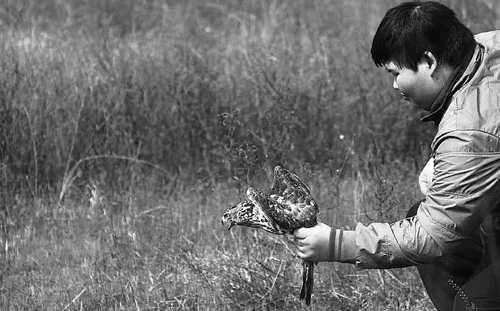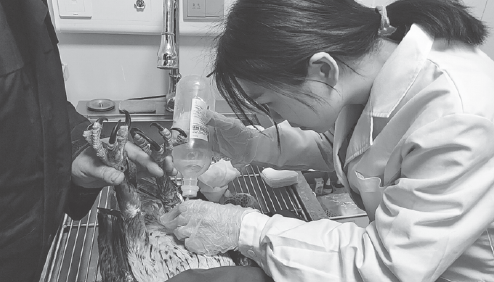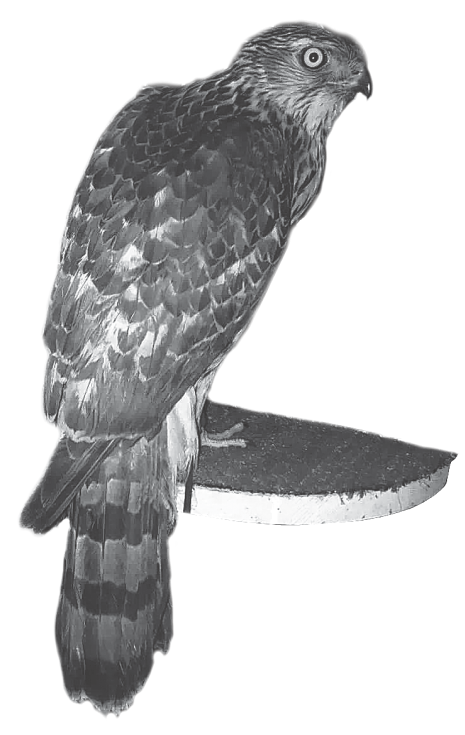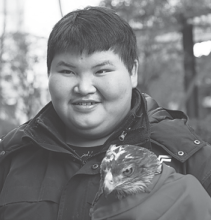'Raptor doctor' sees dreams take flight
Injured creatures find healing hands of a man determined to protect them, Yang Feiyue reports.

Li Simin has two personas. The 32-year-old from Wuhan, capital of Central China's Hubei province, looks tough and fearless when he drives an excavator for various construction projects.
Yet, Li deploys a more focused and gentle touch when he treats wounded birds, especially raptors.
He has been offering a healing hand to the feathered creatures over the years and is affectionately dubbed "raptor doctor" by his friends, bird protection volunteers and even staff members from the local forestry bureau.
Many of them come to him for tips and advice about treating birds.
Li often gives remote instructions for urgent cases. Years of experience has, after all, enabled him to quickly identify the problems.
"They would send me the picture and I'll have them zero in on the possible part where things might go wrong," he says. "The key is to not startle the bird, because it can lead to stress and even death."
Li has developed a tender spot for animals since middle school.
When he saw that a golden retriever became restless after being chained to an iron fence at his residential community, he walked up and calmed its nerves, even though the dog owner just left it there for a short while.
Li started to grow a passion for birds in 2004 when he found, on his way home from school, one that was trying to free itself from a net set up by local farmers.
Instinct saw him immediately get down and untangle the net wires around the bird.
He didn't know it was a sparrow hawk, a small raptor that hunts rats.
Its sharp talon then scratched open the back of his left hand, leaving a scar to this day.
Blood came out but Li carried on until the hawk was released. He then found blood oozing from its mouth. A closer look revealed it had been cut by the net wire.
Li learned from TV animal documentaries he had watched that the wound would probably prevent the hawk from hunting and eating, leading to its starvation and death.
He took the little bird home.
With just a junior high school background and little medical knowledge, Li took the initiative to buy bird-related books and drugs with his pocket money because of a lack of advice from those around him.
The beginning of the treatment didn't go well. The hawk didn't take to the medicine and spat it out. Li then came up with the idea of feeding it beef stuffed with the drug. It worked.
Li's encounter with the hawk occurred right before that year's Spring Festival. He took the bird, in a cage, wherever he went, to his relatives or to gatherings with his friends.
"Keeping it in sight was more assuring," Li says.
He spent all the money his elders gave him as holiday gifts buying food and medicine for the bird, which got back on its feet in two months.
"I couldn't be more thrilled," Li says.
But to be on the safe side, he kept it for a third month before releasing it back to nature.
"As soon as the cage door slid open, it spread its wings and was airborne, very quickly," he says.
"I was glad that more than three months of work meant something, but kind of disappointed that it didn't at least take a look back at me."
The experience led to Li rescuing more birds and reaching out to more raptors, a group which covers falcons, eagles, buzzards and vultures.
They are in a minority among bird species in the country and have often been victims of environmental degradation and illegal wildlife trade. They are all under national protection.
Li's love for raptors grew stronger during his stay in Beijing in 2008.
He says he still remembers the magnificent scene as hawks and eagles hovered above the Great Wall.
Li started to work in delivery services in Wuhan in 2010. Whenever he found struggling birds caught in the nets put up by local farmers on delivery routes, he would get off his motorcycle and go to their rescue.
In his spare time, Li made a point of further learning about bird rescue and medical treatment online and from experts at the Beijing Raptor Rescue Center, established in 2001 by the International Fund for Animal Welfare and Beijing Normal University.
He also joined a rescue team at the Wuhan Bird Watching Society in 2016.
"You can see the light in his eyes when he spends time with raptors," says Yan Jun, chairman of the society.
"He is eager to learn about birds and very gentle, meticulous and patient in treating them," Yan says.
In Li's home, normal saline, syringes and eye masks of various sizes are always ready for any bird emergencies.
He has also developed various gadgets to help wounded birds to recover.
Once, a volunteer sent Li a kestrel that couldn't stand up.
He used ice pop sticks as a brace and made a bed out of old clothes on a wash basin.
The kestrel was nurtured back to health after two weeks under Li's care.
Local law enforcement has stepped up efforts against illegal bird hunting and Li and other environmental protection volunteers have been removing bird nets.
During the 2017 Spring Festival holiday, they dismantled 12 nets and saved more than 40 birds.
They have also been publicizing bird protection knowledge among local villagers, who have taken the initiative to use more scientific approaches to protect both their crops and birds.
In 2017, Li was named one of 13"most beautiful wildlife guardians" by the Hubei Wildlife Conservation Association.
To date, Li has rescued and released more than 100 raptors and in 2019, he joined efforts to track some of the raptors that received aid.
"It needs long-term observation to keep track of their recovery and survival skills in the wilderness," Li says. "If something goes wrong, they could be located and receive secondary aid."
Li checks the birds' flying data on a daily basis.
In particular, he has kept close tabs on a northern goshawk for about three years.
Northern goshawks usually come back to Hubei for winter.
"All of its flying data are good and show its migration routes along the mountains," he says.
Li often drives to the Bafen Mountain area, where he observes raptors with a telescope, especially during autumn and winter when many of the birds migrate back to Wuhan or regions down south.
He also keeps an eye on the birds' breeding, species, numbers and positioning, and reports information back to the local authority, ensuring measures can be implemented.
"The environment in the Bafen Mountain has become increasingly better," Li says, as bird numbers increase.
To his immense relief, more people are aware of the importance of protecting birds.
Speaking about his future plans, Li says he wants to build a bird rescue center, where he can work with more like-minded volunteers.




Today's Top News
- Year of the Horse carries message of resilience, solidarity, industriousness
- China remains anchor of stability in unsettled world
- Stage beckons, festive spirit resonates overseas
- China predicts over 285 million inter-regional trips on first day of Spring Festival holiday
- China extends visa-free policy to Canada, UK
- 2nd round of Iran-US talks to be held in Geneva Tuesday






























